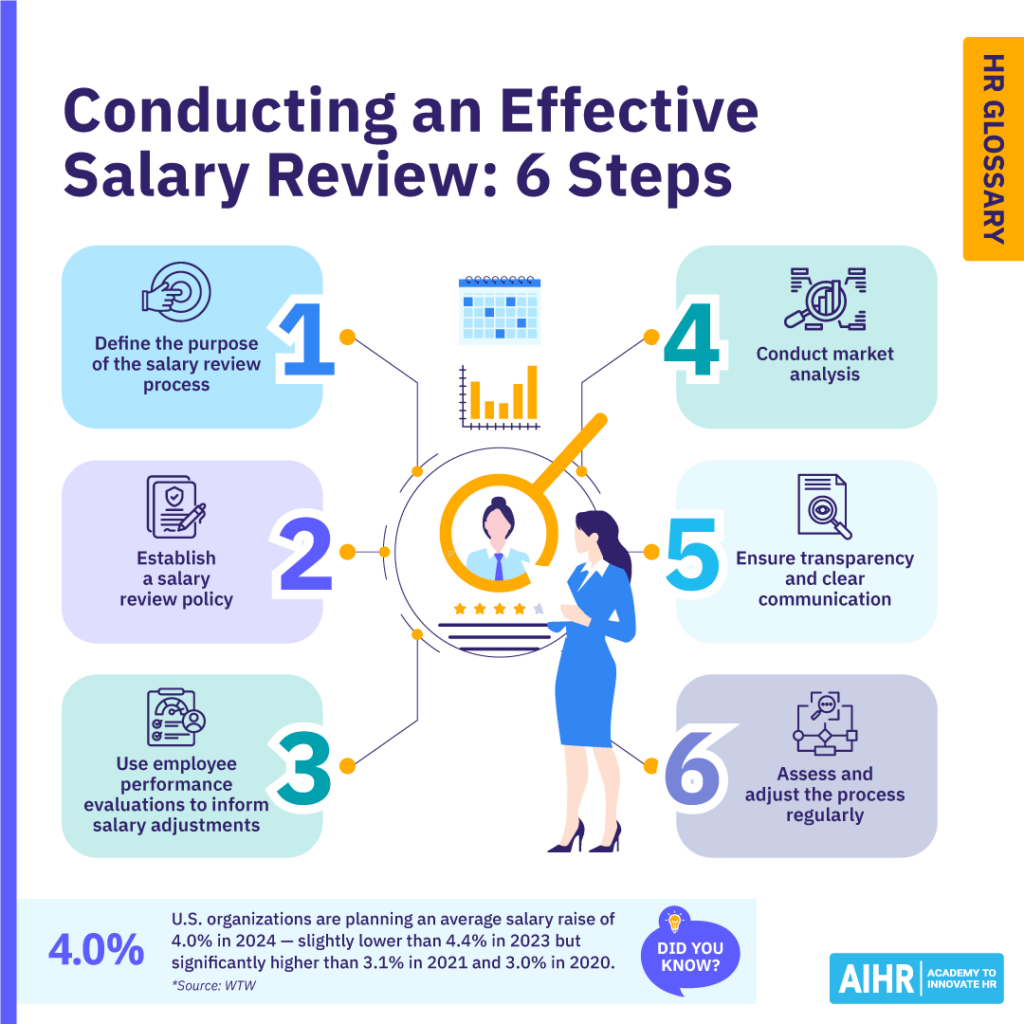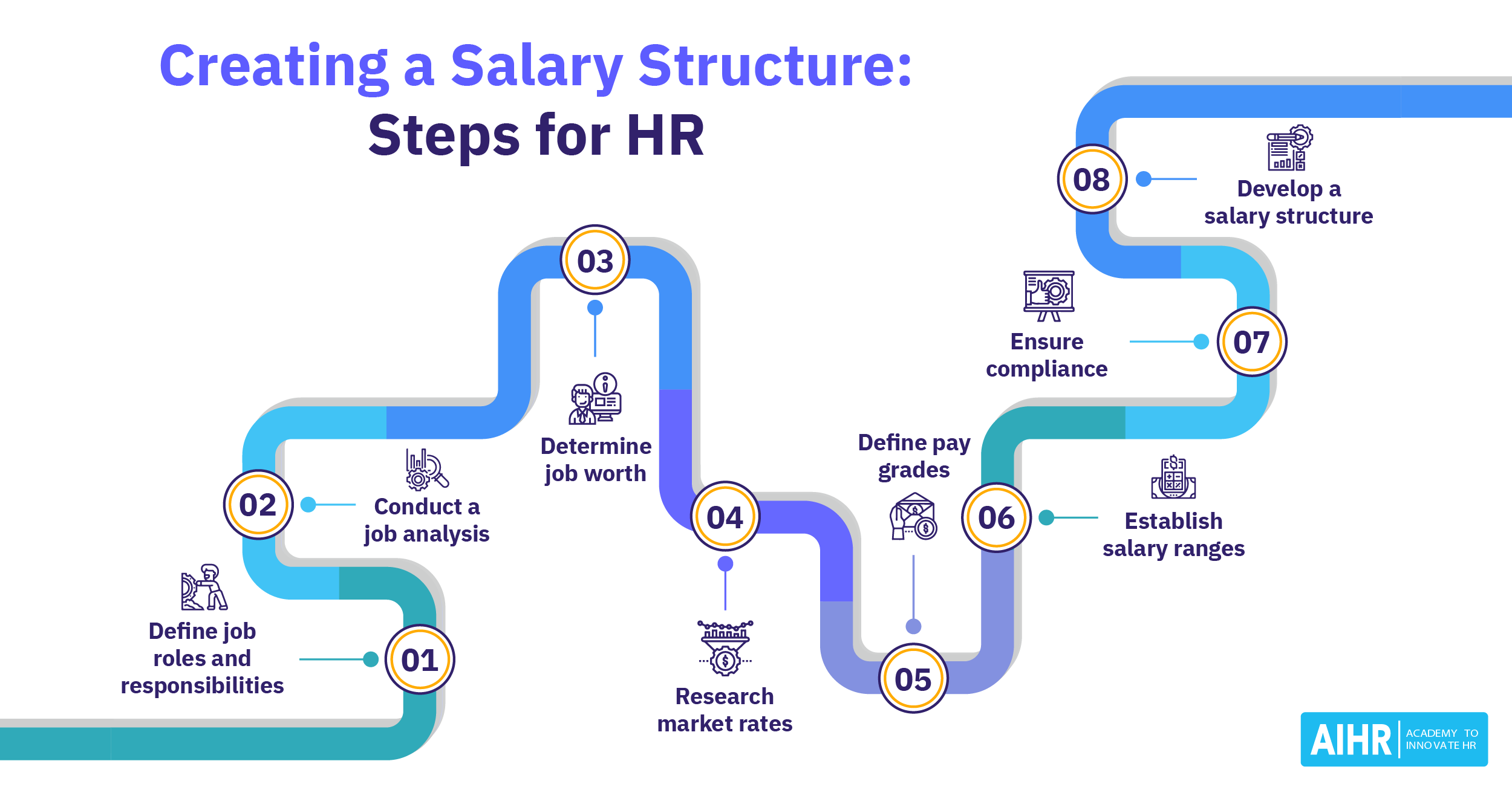Salary Review
What is a salary review?
A salary review is a process where an organization evaluates and potentially adjusts an employee’s salary based on various factors. This process is typically conducted annually or at regular intervals, though it can also occur after a significant event, such as a promotion or a shift in responsibilities.
Maintaining a fair and competitive salary structure through regular reviews is crucial for fostering a sense of security and value among employees. This approach is reflected in recent trends, where U.S. organizations are planning an average salary raise of 4.0% this year — slightly lower than 4.4% in 2023 but significantly higher than 3.1% in 2021 and 3.0% in 2020.
Why are salary reviews important?
Salary reviews ensure fair, competitive compensation aligned with organizational goals. Here are the key reasons why salary reviews are essential:
- Improved employee retention rates: Competitive compensation packages help attract and retain top talent. Regular salary reviews and appropriate increments ensure employees feel valued and compensated fairly in the context of industry standards. It also reduces the risk of losing talent to competitors, thus improving retention rates.
- Trust between employer and employee: Regular salary reviews and adjustments indicate organizational trust in employees, fostering a happier and more committed workforce.
- Alignment with market rates: Salaries for different roles shift based on supply and demand, creating a dynamic job market. Aligning salaries with market rates helps ensure your organization retains its competitiveness and attraction to top talent. It also reduces turnover resulting from pay disparities.
- Performance and productivity boost: Tying salaries to performance motivates employees to excel. This creates a high-performance culture where employees are driven to achieve their goals, knowing that doing so could result in a pay rise.
Positive impact of salary reviews on company culture
Salary reviews profoundly impact company culture, influencing employee morale, engagement, and overall job satisfaction. When implemented correctly, salary reviews contribute positively to the organizational environment by:
- Contributing to workplace fairness and equality: Fair, transparent salary reviews help ensure proper compensation for employees based on their skills and contributions, as well as industry standards. They promote equity, reduce potential bias and discrimination, and strengthen the company’s commitment to fairness.
- Fostering trust among employees: Regular and transparent salary reviews also demonstrate that the organization values its employees. They can foster trust, encourage open communication, and create a work environment where employees feel respected and appreciated.
Negative impact of poorly managed salary reviews
On the other hand, poorly managed salary reviews can have detrimental effects, such as:
- Perceptions of unfair compensation: Employees may perceive their pay as unfair if salary reviews are inconsistent or lack transparency, leading to dissatisfaction, feeling undervalued, and, ultimately, a higher turnover rate.
- Dissatisfaction and lowered employee engagement: Inequitable or poorly communicated salary decisions can demoralize employees, decreasing motivation and engagement. This can harm overall productivity and contribute to a negative work environment.
Performance reviews vs. salary reviews
HR professionals and employees must understand the distinction between performance reviews and salary reviews. Here are the key differences between the two:
Purpose
Evaluate employees’ job performance, identify strengths and weaknesses, and provide feedback for improvement.
Assess employees’ compensation packages based on performance, market rates, and company policies.
Focus
Employees’ skills, achievements, goals, and areas for development.
Employee salaries, benefits, bonuses, and overall compensation packages.
Outcome
Development plans, training recommendations, goal-setting, and feedback for future performance.
Salary adjustments (increase, decrease, or no change), bonuses, and benefits revisions.
Frequency
Annually or semi-annually, though some organizations opt for quarterly performance reviews.
Annually or semi-annually, though some organizations opt for quarterly performance reviews.
Salary review vs. salary increase
While a salary review and a salary increase may seem synonymous, they serve different purposes.
A salary review evaluates an employee’s current compensation against factors such as market rates, internal pay equity, and individual performance to determine whether it needs adjustment.
This could lead to a salary increase, though not if the employee’s current salary is considered appropriate. On the other hand, a salary increase entails actually raising an employee’s pay. This could result from a salary review, promotion, or company-wide pay raise.
HR tip
Clear, consistent communication is vital when conducting salary reviews. Employees should understand the review’s criteria, how management makes decisions, and what they can do to earn a pay raise. This transparency helps build trust and encourages employees to align their performance with organizational goals.
How can HR implement an effective salary review process
An effective salary review process is crucial for maintaining fairness and competitiveness in employee compensation. Here is a step-by-step process HR can follow:
- Define the purpose of the salary review process: Clearly outline the objectives of the salary review process. Whether it’s to reward high performance, ensure market competitiveness, or address pay equity issues (or a combination of all three), defining the purpose helps align the process with employee needs and the organization’s compensation strategy.
- Create a salary review policy: Develop a comprehensive policy that details salary review frequency, valuation criteria, and how to communicate salary decisions. This policy should be transparent and accessible to all employees.
- Use employee performance evaluations to inform salary adjustments: Integrate performance evaluations into the salary review process to ensure that salary adjustments reflect individual contributions. This helps reward top performers and encourage others to improve.
- Conduct market analysis: Regularly benchmark salaries against those your organization’s competitors offer for similar roles. This will help ensure your compensation packages are competitive. Be sure to research market data, consider geographic differences, and understand industry trends.
- Ensure transparency and clear communication: Communicate salary review results to employees clearly and promptly. Transparency builds trust and helps employees understand the rationale behind their compensation adjustments (or lack thereof).
- Assess and adjust the process regularly: Salary reviews should not be a one-time event. Regular reviews and adjustments ensure fairness, competitiveness, and alignment with organizational goals and market conditions.

FAQ
Organizations typically conduct salary reviews annually. However, depending on company policies and job market dynamics, they may also conduct them semi-annually or quarterly.
A performance review evaluates an employee’s performance, strengths, and areas for improvement, focusing on professional development. In contrast, a salary review assesses whether an employee should have their pay adjusted based on their performance, market rates, and internal pay equity.









